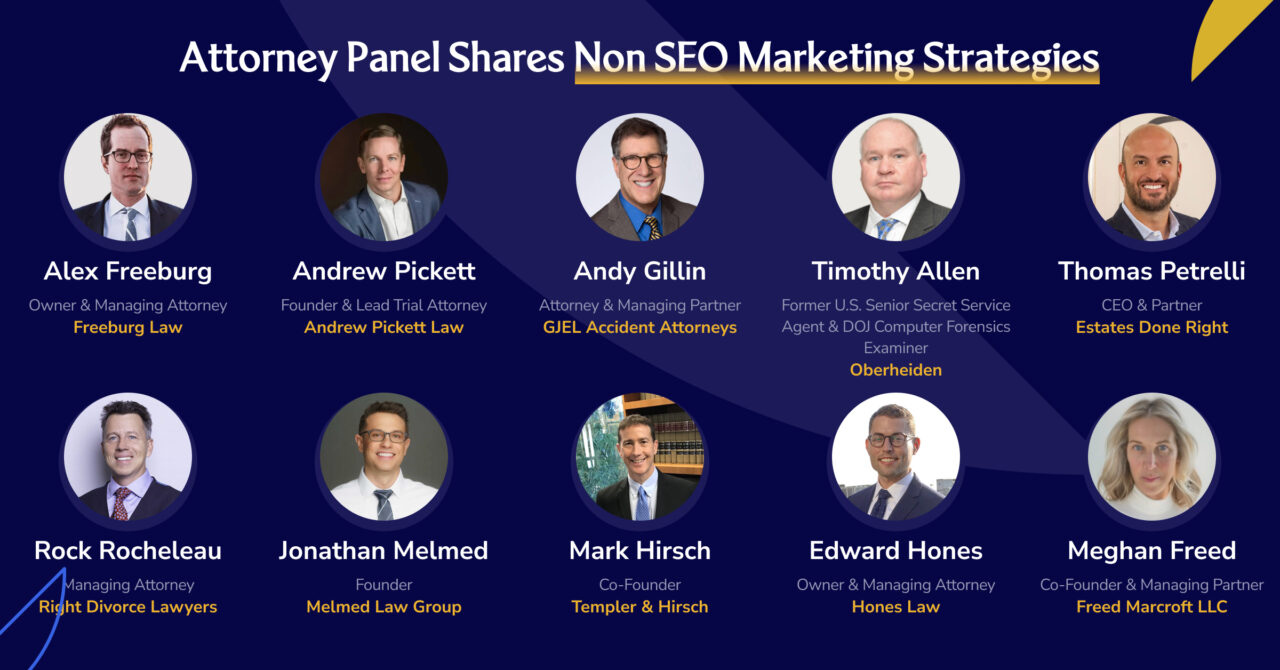When SEO Fails Law Firms: 5 Alternate Marketing Strategies
Make no mistake that law firm SEO is a critical aspect of legal marketing.
It’s probably the most effective tactic for generating leads.
But it doesn’t always match every law firm’s marketing goals.
In this post, ten attorneys share five go-to law firm marketing strategies when SEO is out of the question.
Let’s get started.

1. Try Local and Community Engagement
Local SEO is a low-risk, high-reward strategy that every law firm should pay attention to. But it’s not the be-all and end-all of local marketing.
Alex Freeburg, owner of Freeburg Law, believes that community involvement is a great way to gain traction.

We’ve had better success with hyper-local content that speaks directly to the concerns of our community. Things like sponsoring local events and volunteering have also helped us build trust and brand recognition. We also focus on referral relationships with complementary professionals like insurance pros, accountants, and financial planners.

Andrew Pickett, founder and lead trial attorney at Andrew Picket Law, emphasizes the importance of a more direct approach to outreach and relationship building, especially in saturated local markets.

SEO can falter when local competition is overwhelmingly intense, or the target audience is less inclined to search online. For example, personal referrals often yield more fruitful results in niche markets than online strategies. Also, when working with clients who prioritize immediate legal concerns, direct-outreach methods, such as networking events or community involvement, tend to foster relationships more effectively than digital marketing.

Aside from direct community engagement, take note that you can also reach a local audience by providing valuable, educational content tailored to their needs.
GJEL Accident Attorneys managing partner, Andy Gillin, suggests hosting your own webinars and creating content specifically for the local audience to generate leads.

Attend relevant industry conferences, participate in panels, or even host your own webinars. Create valuable, informative content that speaks directly to your specialized audience and share it through relevant industry channels or forums. This method can position you as an authority in your niche and yield higher-quality leads, often through word-of-mouth or direct referrals.

Gillin also mentioned that SEO is “not always the best strategy,” especially for niche or boutique law firms.
“If your firm specializes in a very specific type of law, like maritime law or antique firearm regulations, your potential client base may be too small and specific for SEO to yield meaningful results,” says Gillin.
2. Focus on Improving Your Reputation
Whether you’re focusing on community engagement or getting your feet wet in local SEO, working on your law firm’s reputation is a big step forward.
Senior corporate investigator and former senior Secret Service agent Timothy Allen underlines the value of reputation management in terms of attracting quality leads.

Reputation and word-of-mouth were key. SEO can be important, but in our case, developing a solid reputation through word-of-mouth proved significantly more effective. Our clients came to us through referrals from friends and family who had had excellent experiences with our firm.
We focused more on providing outstanding service, which prompted our delighted customers to spread the word. In addition, we encouraged reviews on platforms such as Yelp and Google. This was more effective in attracting quality leads than competing for top search rankings. Our resources were better spent on building solid relationships with our clients and our network than on SEO campaigns.

3. Referral Networks Are the Secret to High Net Worth Leads
While traditional networking and local marketing are important, you can also attract leads with referral marketing.
Thomas Petrelli, founder of Estates Done Right and partner at Petrelli Previtera, LLC, especially recommends it for high-net-worth individuals. He feels such folks are best reached by earning referrals from the people they trust.

At Estates Done Right, we’ve found SEO less effective when targeting high-net-worth individuals, who often rely on personal referrals. Instead, we’ve had great success building relationships with financial advisors and accountants, who frequently refer clients needing estate-planning services.

4. Leverage Social Media to Build Brand Awareness
Social media is a key component in law firm networking. It also lets you form closer and more profitable connections with potential clients.
Rock Rocheleau, CEO & Managing Attorney at Right Divorce Lawyers, advocates for the use of social media to build closer relations with clients faster.

Leveraging social media platforms can provide a more direct, human connection with potential clients. Posting videos, sharing success stories, or answering common legal questions helps engage users who may not be searching for legal services yet but are likely to need them in the future. This can be a great complement to SEO or, in some cases, a better option for firms looking to build brand awareness quickly.

Of course, social media doesn’t invalidate the long-term value of SEO. But it does fill a gap for those who need cost-effective strategies (for example: new law firm founders).
5. Get Instant Traction With Pay Per Click Ads
PPC advertising can help lawyers generate new clients from day one. This is the precise opposite of SEO, which takes a considerable amount of time before resulting in huge gains.
“Paid advertising, such as Google Ads or Facebook Ads, allows law firms to reach potential clients immediately, bypassing the slow ramp-up of SEO,” says Rocheleau.
Sharing this sentiment, Jonathan Melmed of Melmed Law Group believes that paid advertising and social media marketing hold the key to success for small firms in saturated markets.

In our experience at Melmed Law Group, we’ve found alternative strategies like targeted pay-per-click (PPC) advertising, social media marketing, and referral networks to be more effective. For example, PPC allows us to gain immediate visibility, while social media platforms help engage with a broader audience. Building strong relationships with referral partners and focusing on client satisfaction have also led to a steady stream of leads, proving that sometimes a multi-channel approach can yield better results than relying solely on SEO.

Mark Hirsch of Templer & Hirsch Injury Lawyers also believes in the potential of PPC and social media marketing.
According to Hirsch, not all law firms can provide the long-term commitment and funding to get worthwhile returns from SEO.

In very specialized fields, search volume may not be high enough to make SEO efforts worthwhile. Pay-per-click (PPC) ads, local networking, and social media engagement are other tactics that can work faster in these situations. In areas with a lot of competition or little traffic, referral relationships and platforms like Google Ads or Facebook Ads can help you get leads faster than SEO.

Another advantage of PPC advertising is, you can fine-tune your campaign to target prospects who urgently need your services.
Edward Hones, owner and managing attorney at Hones Law, prescribes PPC advertising alongside referral marketing and direct community involvement for firms looking for quick results.

In my experience, alternative marketing strategies like targeted paid advertising (PPC), referral networks, and community engagement have sometimes proven more effective. For instance, leveraging PPC ads can provide immediate visibility to potential clients, particularly when targeting niche or urgent legal needs. Cultivating strong referral networks with other professionals, such as accountants or real estate agents, or actively participating in community events, has led to more direct client leads for our firm. These methods often offer a quicker return on investment and can build trust and credibility in ways that purely digital strategies like SEO might not achieve alone.

As far as scaling your advertising strategy, Meghan Freed of Freed Marcroft LLC recommends comprehensive platforms like LinkedIn Ads and Google Ads. These platforms come with built-in analytics to help you track, optimize, and maximize your ROI from advertising.
More importantly, Freed also reminds smaller firms not to leave SEO completely off the table. After all, SEO is still crucial for a balanced marketing strategy that addresses both short-term and long-term goals.

Paid advertising on platforms like LinkedIn or Google Ads can also deliver faster results for client acquisition, especially if you target specific demographics or practice areas. These strategies allow for more immediate tracking of ROI and can adapt more quickly to changes in the market. By combining these approaches with SEO, you can create a well-rounded marketing strategy that addresses both long-term and short-term goals.

Just remember to observe and adhere to the existing law firm advertising rules before you get heavily invested in the complex PPC landscape. These rules are outlined in the ABA Model Rules of Professional Conduct with emphasis on Rule 7.2: “Communications Concerning a Lawyer’s Services: Specific Rules.”
Final Thoughts
Rock Rocheleau feels “SEO remains valuable for long-term visibility, but it isn’t always the most practical approach for every firm.”
Promoting a law firm without SEO involves tactics like:
- Winning the local community’s trust
- Improving your reputation
- Acquiring referral leads
- Using social media
- Investing in PPC advertising
Do you feel like SEO isn’t a fit for your firm right now? We’re about all things lawyer marketing. Contact us for a consultation, and we’ll try to find the best tactical mix for you.
Table of Contents
Related Articles
Dominate Your Market with Digital Marketing Services That Deliver
Talk to a certified professional today, and we will design a strategy specific to your case.







